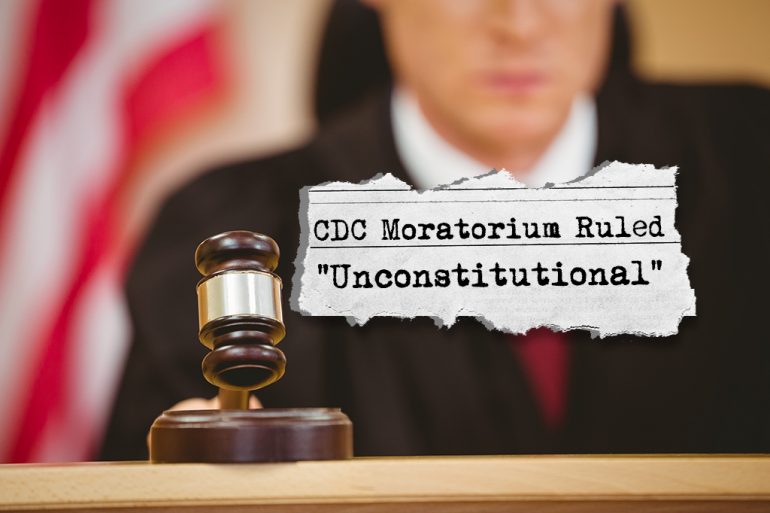CDC Moratorium On Evictions & Foreclosures Ruled Unconstitutional!
Updated 03/30/2021:
Shortly after I created the article at the beginning of March the CDC appealed.
Because the Texas Court stopped short of granting the injunction, bc they thought that the federal government was going to comply, it’s not nationwide anymore.
A federal court in Ohio also recently found it to be unconstitutional.
There are two appeals pending one in the 11 Circuit court of appeals and the other one in the 5th Circuit Court of appeals.
Based on my reading of the rulings, the appellate briefs, etc. If I were a landlord I would include a constitutional argument making reference to those rulings in my filing of the eviction proceedings.
What we are recommending our clients to do is to send notices of termination of months to month tenancies, that way the eviction action is filed under the basis of a holdover tenancy rather than a non-payment of rent. Holdover tenants are not protected by the CDC order.
Update on the CDC Moratorium – Yes, It’s Officially Unconstitutional!
In September of 2020, I informed the investor community at PropertyOnion.com that the CDC moratorium was likely unconstitutional and would be challenged. It was.
A federal judge in Texas ruled the CDC’s actions unconstitutional on February 25, 2021. This applies nationwide.
You’re probably wondering how this ruling in Texas affects your real estate investments in Florida. Well, when a federal court rules that a federal law, directive, rule, or otherwise is unconstitutional, then the law is no longer in effect.
The judge in the case expected the CDC to abide by its decision and stopped short of granting an injunction against the CDC. However, the CDC, contrary to their representations to the very same judge, have now filed an appeal in the 5th District Court.
The plaintiffs in the Texas case are likely to seek an injunction to prevent the CDC from continuing activity that has been declared unconstitutional.
Why Was the CDC’s Moratorium Ruled Unconstitutional?
It’s simple — the CDC’s and the federal government’s authority do not extend to rental agreements between landlords and tenants on the basis of health. The federal government’s authority to legislate on matters not specifically listed in the Constitution of the United States stems from the Commerce Clause.
In order for a federal law to have authority under the Commerce Clause, it must have a sufficient connection to interstate commerce or international commerce. For a congressional act to have authority, it must regulate:
- The use of the channels of interstate commerce
- The instrumentalities of interstate commerce, or persons or things in interstate commerce
- Those activities having a substantial relation to interstate commerce
In other words, there must be a rational basis to conclude that the regulated activity substantially affects interstate commerce.
Determining a Local Activity’s Substantial Effect on Interstate Commerce
There are four significant considerations that must be assessed in determining the local activity’s substantial effect on interstate commerce:
- The economic character of the interstate activity
- Whether the regulation falls under the jurisdiction of interstate commerce
- Congressional findings on the effect of the regulated activity on commerce among the states
- The attenuation (reduced, weakened, or diminished effect) in the link between the regulated activity and interstate commerce
The economic character of a regulated activity (here a private lease agreement between a landlord and a tenant) cannot be examined in abstract. There must be a real connection between the regulated activity and interstate commerce.
Tenancies are not commodities traded in the interstate market. The CDC moratorium regulates property rights in buildings, which are inherently local and involving property that does not move across state lines. The CDC moratorium attempts to criminalize the possession of private property by the property owner. This is not an economic activity, per the federal court’s ruling.
The CDC moratorium was also found to lack a jurisdictional element. In other words, nothing in the moratorium attempts to limit itself to tenancies crossing state lines or transporting commercial activity across state lines or internationally.
The federal court concluded that the mere fact that an activity (here, renting property) has some sort of a tie to national employment or socioeconomic statistics is not enough of a connection to pass constitutional muster.
As for attenuation, evicting a person from residential real estate does not have a substantial effect on interstate commerce. Evictions are not an economic activity — they are actions to enforce possessory property rights. The moratorium, as written, applies to all tenants, regardless of infection of, prior exposure to, or vaccination against COVID-19. This is not a quarantine-type order under the purview of the CDC.
Historical activity of the federal government plays a strong role in the ruling as well. If the federal government did not make such declarations during the Spanish flu pandemic, the Great Depression, etc., then there is no historical justification for impairing, much less criminalizing, such a significant property right which is lawfully authorized under state laws.
The CDC Simply Doesn’t Have the Authority to Uphold the Moratorium
The CDC (and therefore, the federal government) claims to have authority to suspend residential evictions for any reason, including “fairness.” However, contrary to their position, the federal government in the United States does not have such broad authority.
It is the states, under Article X of the Constitution, that have the broad authority to legislate: “The powers not delegated to the United States by the Constitution, nor prohibited by it to the states, are reserved to the states respectively, or to the people.”
Article I of the Constitution does not include the power to impose the eviction moratorium. The federal court reasoned that the type of activity the CDC moratorium attempted to regulate is part of the states’ police power, the sovereign right of local governments to protect the lives, health, morals, comfort, and general welfare of their residents.
While the states can and do possess the authority to implement moratoriums on evictions and foreclosures, such broad authority was simply never retained by the federal government. As Judge Barker put it, “Although the COVID-19 pandemic persists, so does the Constitution.”
Alas, the status of the CDC moratorium remains up in the air in spite of the ruling. The federal government’s communications with the media since they filed for an appeal indicate that they do not see the ruling as applicable nationwide.
The Department of Justice noted in announcing its appeal, “The decision…does not extend beyond the particular plaintiffs…and it does not prohibit the application of the CDC’s eviction moratorium to other parties. For other landlords who rent to covered persons, the CDC’s eviction moratorium remains in effect.”
In my opinion, this is an absurd claim. Unconstitutional means just that — unconstitutional. It may be that the plaintiffs will now be granted the injunction against the CDC. Stay tuned, property owners…








